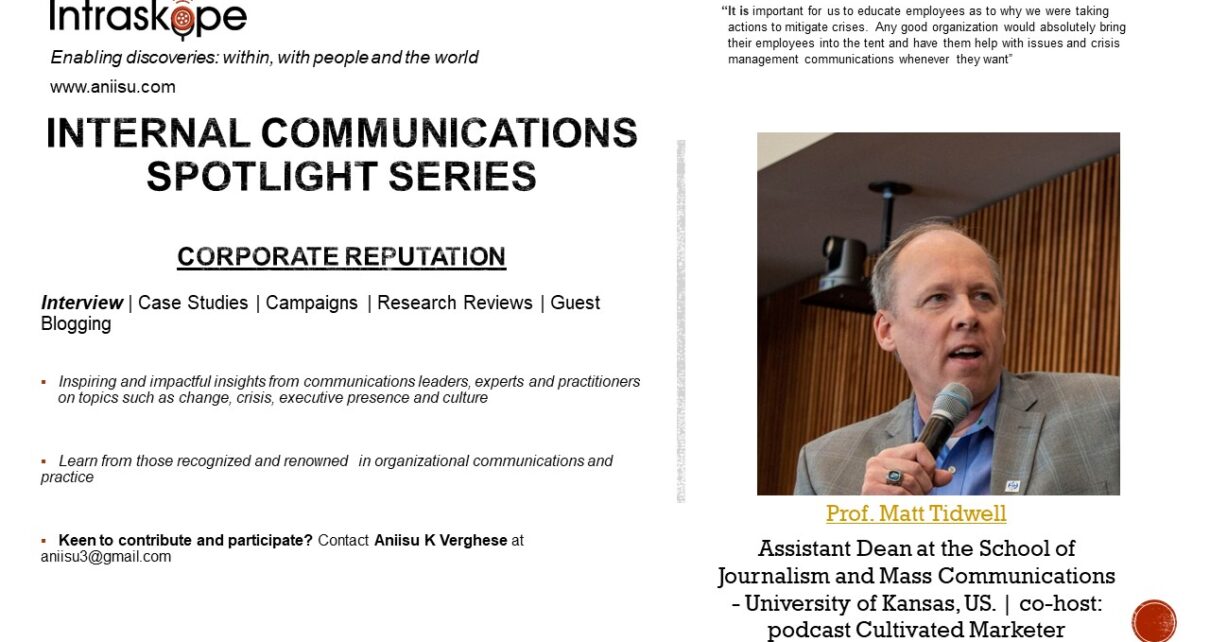Welcome to the 8th edition of Intraskope’s Spotlight Series featuring Prof. Matt Tidwell, a leading authority on crisis communications and reputation. With deep experience in strategic communications, marketing, branding, internal communications, crisis communications, higher education, Prof. Matt serves as the Assistant Dean at the School of Journalism and Mass Communications at the University of Kansas, US. He is also the co-host of the podcast Cultivated Marketer: https://www.cultivatedmarketer.com/episodes/. Prof. Matt, actively participates to raise the level of communication standards globally as a member of the International Executive Board for IABC (International Association of Business Communicators).
“Often, we think that there will be a rebound of its reputation when an organization does a good job with managing a crisis. While we do see a rebound, what’s interesting is it’s taking longer for it to happen. It is taking longer for organizations to recover. The reputation rankings are often not at the level that maybe organizations had prior to the crisis. That should be a message to all organizations that they need to take crisis communication and transparency seriously, or it will have huge implications,” says Prof. Matt.
About Intraskope’s Spotlight Series
In this series I interview key thought leaders on topics interrelated with internal communications such as culture, crisis, change, executive presence and leadership. The goal is to help unravel why they matter, what can leaders and communicators learn from experts and how we can put insights to practice. Watch these short interviews and get better at understanding these key topics and how you engage with internal communications.
Interview
- You did your thesis on crisis and reputation and are an expert in this space. What are the issues that organizations grapple with when it comes to crisis management?
I think there, there are two primarily that I see. One is a lack of preparedness, and you would think in this day and age that we would see organizations be completely crisis prepared but of course many times that’s not the case. Frankly for some larger organizations that I can think of, sadly, I’m not sure. We’ve often grappled with why that is, whether it’s just the organizational will and commitment, whether it is sort of the “bury your head in the sand” mentality? That certainly is a phenomenon. Again, we would think that there would be less but we still see it. So, I think lack of preparedness would be the first one. The second one that I would say is poor alignment. And many times, poor organization. So, the ownership for crisis communications might not necessarily rest in the communications department. Strangely, oftentimes we see it in other areas, which of course is an example of poor organization. And I say poor alignment because a lot of times, particularly in the last 20 years, ever since. Jim Collins graced us with Good to Great (the book), organizations have been very focused on their core purpose and on their values and so many of them in fact, went to great lengths to develop values programs. Oftentimes and I’ve studied this, you see poor alignment between an organization’s stated values in their crisis communications planning, you would think those two would be very closely attached. Many times, they aren’t. So, I think that there are definitely organizational alignment issues that also plague organizations in this field.
2. How important is internal communications in managing crises and what must organizations do to take employees along during a crisis?
Such a great question because it absolutely has vaulted into much more prominence than it was certainly when I broke into the business 25 years ago or so. Employees have risen steadily up the stakeholder ranking. At the end, it used to be that employees were somewhere you know down there were almost an afterthought. Frankly, in many organizations and typically if you look back to the 60s and 70s, the kind of the Mad Men era – what we’re seeing now is that they recognize that investing in proper internal communications is important. So, employees have nearly a large stake in the organization, but they have a large role to play. When we are facing issues and crises – I can remember working for a large energy company in my organization and in the community, we went through a situation where we raised our customer rates that they were paying for their electricity, three times in the span of about three years. That was an issue for us to manage. It didn’t always rise to a crisis but certainly was an issue. And so we relied heavily on our employees to be out as ambassadors in the community to explain why we were taking these actions. The community was growing, we needed to invest, we were building out downtown, and so that took lots of infrastructure and electricity and investment which was good for the community, but of course that has a cost as well. And so it was important for us to educate employees as to why we were taking those actions and so I think any good organization would absolutely bring their employees into the tent, and have them help with issues and crisis management communications whenever they want.
3. What is the impact to an organization’s brand and reputation in relation to crisis communications?
The value is huge. I think, a crisis can make or break an organization’s reputation. Again, much more so than we saw decades ago. Companies and nonprofits are under much more scrutiny than they were decades ago. The stakeholders are more demanding and demand things like transparency. Also, a high degree of transparency and communications from the organizations. I mentioned the energy company which is a good example. If you’re in the community, you want your energy company to communicate with you as to why they’re doing what they do so. If you don’t, that then your reputation will suffer, and we see that there are good reputational tools out there. Rep Tracker Harris and others that track organizations and this is another area where I’ve done some research in. Looking at when a crisis befalls an organization, what does that do to their reputational rankings. Now of course, we see a dip, oftentimes we think that there will be a rebound if the organization does a good job. And we do see that rebound but what’s interesting is it’s taking longer for it to happen. It is taking longer for organizations to recover. When you look at those reputation rankings over time, it used to be the recovery curve would begin quickly. Now there’s a much longer steep, almost more of a level of curve to retain or to achieve the level of reputation that maybe they had prior to the crisis. So, I think that should be a message to all organizations that they need to take crisis communication and transparency seriously, or it will have huge implications.
4. How can organizations recover from a crisis using communications?
I think as marketing communicators, we have a huge role. I think we should be very much out in front, with leadership of the organization to make sure they understand the implications of not being prepared. And so I think that that’s a key role for marketing communicators and that’s why at all of the major organizations (I’m on the board for IBC but there are several in Europe and we have PRSA here in the US), I think what you’re seeing is in events and conferences, the number of presentations around crisis are much more than what they were a few years ago. Everyone is getting that message that as communicators, we need to be the ones banging the drum for effective preparedness, and so not only advocating for it but of course using our tools as communicators to then fashion the appropriate plans, develop the appropriate practice. We need in large organizations to make sure that our skills are sharp in this area.
5. With the pandemic throwing up its share of crises, what is the role of the communicator in shaping the organization’s narrative?
I think what the pandemic has done is all those good practices that we’ve talked about -transparency, placing your expertise is front and on display as an organization; those have all just been magnified. And those who were operating in a certain way pre-pandemic and trained to engage stakeholders, there is no going back to the old ways of functioning post pandemic. The demand from stakeholders for transparent and timely information will continue. There’s no turning back, as they say. So I think the pandemic has magnified, what we do and the importance of what we do and then I would say that it has, and will have long term effects, because we will have to keep up those good practices after the pandemic.
6. What can leaders and managers do more to take control during a crisis?
I had some good examples during the pandemic, that I share with my classes. We unfortunately lost Arrnie Sorenson, a fantastic CEO. The CEO of Marriott put out a five-minute video to all employees. That was very straight and to the point on what’s happening, what the implications will be and how the executive team is taking a pay cut. They had to close properties around the world as they were considering retro-fitting for, cleanliness and disinfecting and things like that. He had a very specific action plan that was communicated almost immediately. And it struck me and the point that I make to students is an example of good leadership in a crisis. Explaining the actions that you’re taking clearly, but also very quickly to get out in front and take control. The nemesis of crisis communication is the rumor mill, and I think leaders can do much like Mr Sorenson of disarming that rumor mill by being out front, very quickly. I would recommend to leaders that I talk with, particularly if you’re in a high visibility organization like say Marriott, that yes within 24 to 48 hours you have to be out with your message. What your action plan is and so forth. I think good leaders have talked to employees and people like that and other organizations where the information wasn’t quite as free flowing, really not only in the beginning but throughout the crisis. And so all that leads to is more uncertainty. More ginning up of the rumor mill, none of which is good for us as communicators, as we all know.
7. What is your advice for communicators to be more adept in managing their organization’s reputation?
if your organization must have a well-developed values program and communicators must insist on that alignment. If our values honesty and transparency, let’s not make those just nice plaques that we hang up on the conference room wall. As communicators let’s insist that those values, play a role in our communications. And because I think what happens is many times, they are just plaques on the wall. We don’t put any real operational strength behind them. And so that ends up being very visible to our, to our stakeholders and we’re not really walking the talk. I think that this is important for communicators, particularly as you move to more leadership roles. If you’re an entry level communicator I understand this can be hard to do, but for many for instances of our members at IABC and PRSA and others that I deal with, we talk about insisting that your values be something that, that live and breathe and have a role in your communications operations.
Watch the complete video interview on YouTube or read the transcript above.
Missed the earlier episodes? Watch them here: D. Mark Schumann (Culture), Peter Yorke (Executive Presence), Sia Papageorgiou (Leadership Communications), Dianne Chase (Strategic Storytelling), Gloria Walker (Communication Planning), Rebecca Sangster-Kelly (Stakeholder Management) and Ray Walsh (Localizing Employee Communications).
You can also look up the ongoing Intraskope’s Spotlight on Internal Communication Series featuring practitioners from around the globe sharing best practices and perspectives.
Liked the interview? Post your comments and share it with your network.
Keen to contribute and participate in the Spotlight series? Write to me at [email protected]
Here are Internal Communications resources you can use:
- Learn: Internal Communications Fundamentals Course on Thinkific or Udemy
- Internal Communications Series: https://forms.gle/KcqmPzLwq7NQi5Km6
- Chat with Aniisu – Internal Communications: https://www.instamojo.com/intraskope/connect-with-aniisu-60-minute-personalized-d/?ref=store
- Internal Communications workshops: https://bit.ly/2zdBRl1
You can also visit my website www.intraskope.com and You Tube channel to know more about my work.
#IC #reputation #risks #crisis #reputationalrisk #crisiscomms #trust #leadership #authenticity #internalcomms #communications #internalcommunications #leadership #covid19 #profmatttidwell #intraskope



